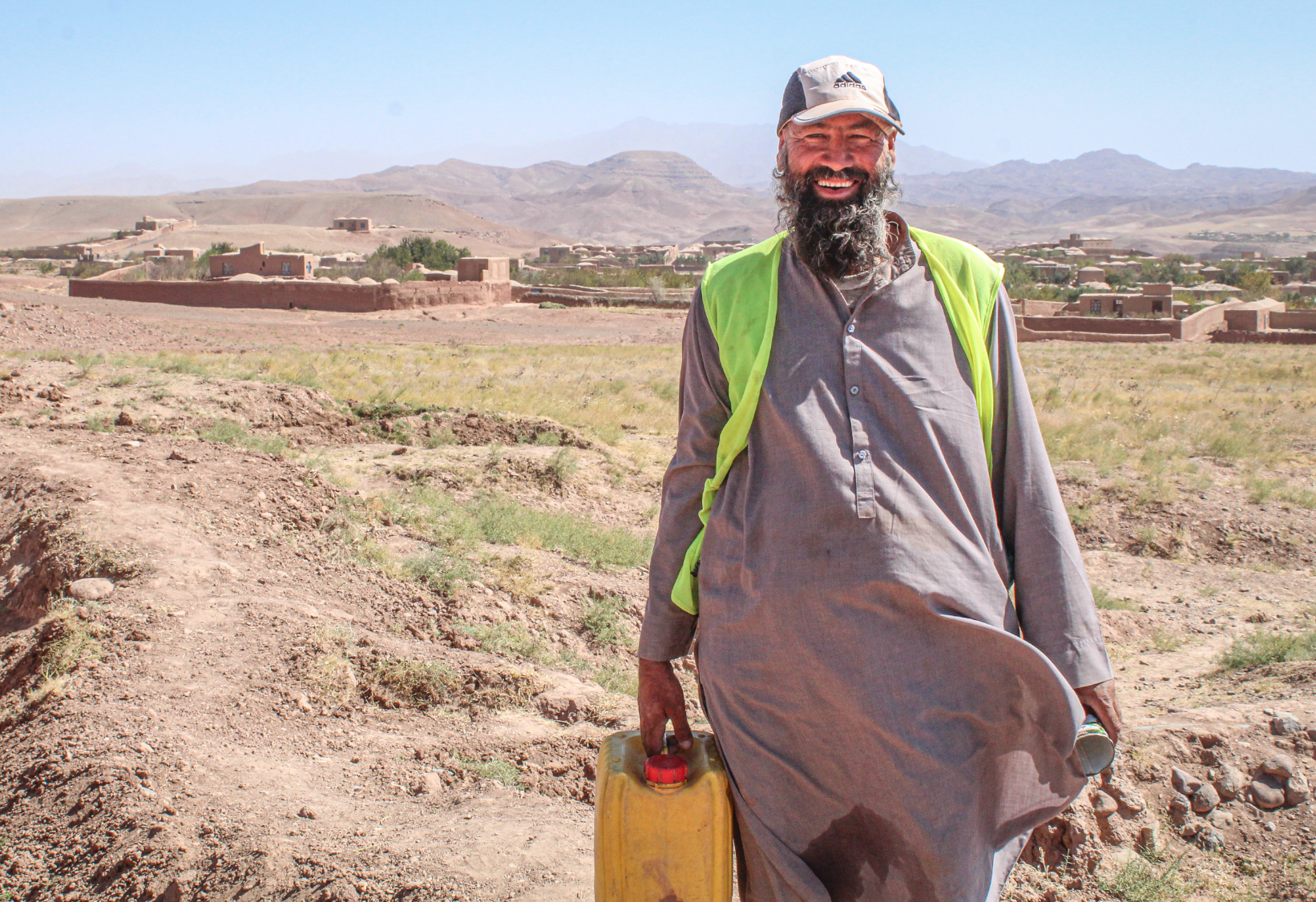These programmes are expected to help stabilize livelihoods and strengthen food security in the coming harsh winter.
The Water Carrier
November 27, 2022

Jomagol is pleased with his job. “My family is so happy that now I can buy rice, wheat, soap, and medicine. I feel relieved now that I have paid back loans from relatives.
Jomagol Osmani has an important job: he is a water carrier, providing fresh drinking water to thirsty labourers digging an irrigation canal. The canal provides water to three villages in the Karukh district of Herat Province in western Afghanistan. After years of neglect, the canal had filled with sediment, but a new UNDP project, in partnership with Islamic Relief Worldwide, is now restoring it.
Afghanistan is struggling with a serious economic crisis, and Karukh is one of the most underdeveloped areas in the region with extremely high rates of poverty. The roads are poor, forests are degraded, and after years of drought, the area suffers from a chronic water shortage, which means it is difficult to grow food to sell or eat.
Local community elder Mohammad Essa says, “In the last four years, many farmers have lost all their crops due to drought, especially crops that need more water, such as wheat.”
Appropriate management of water and land in this area can improve people’s lives, bringing in more income and contributing to food stability. Under its flagship programme, ABADEI, UNDP Afghanistan is cleaning and restoring this 6.4 km Zamanabad canal in the district, securing a steady flow of water to 2.6 square kilometres of wheat and saffron fields. Cleaning the canal will also provide paid work for 1,039 community members like Jomagol Osmani during off-farming seasons.
Workers on the project are selected through consultation with the community. Community elder Mohammad Essa says, “We selected Jomagol for this project because he is one of the poorest people in the village. He doesn’t own any land, livestock, or a house.”
Jomagol lives with his wife and four children, and until he got work on the canal restoration team he worked as a casual labourer, earning just 150 Afghanis (US$ 1.5) per day when he can. Previously, he used to travel abroad to Iran in search of employment, but the pandemic made that impossible. His family had been depending on loans and charity to survive since, often living on just cereal and tea. To make matters worse, Jomagol has been seriously ill.
Jomagol says, “I had given up hope, before they told me I had been chosen to work on the canal project. Since then, I have been earning money every day.” Jomagol now makes 750 Afghanis (US$ 8.50) a day, paid all his debts and is ready to open his own greengrocer. His job involves monitoring safety on the project, as well as providing water to the workers.
Mohammad Essa envisages changes in his community “People have started to get their land ready for the improved water supply when the canal rehabilitation is complete. Life will be easier in the coming winter.” Another community member, Abdelrahman Qolam, added, “We were jobless and hopeless, but now we are working. We can buy food for our families. We hope these activities will continue.”
The rehabilitation of the canal is one piece of the puzzle for creating a vibrant local economy. UNDP Afghanistan this year, with support from partners, cleaned and rehabilitated more than 360km of canals, improving irrigation for 46,718 football fields wide of farmland, reaching almost 500,000 Afghans in need of better irrigation. In the western region of Afghanistan alone, 50 community infrastructure projects have been carried out this year, providing some 104,000 skilled and unskilled workers with work, and providing direct cash payments of US$ 945,000 to workers like Jamagol. These programmes are expected to help stabilize livelihoods and strengthen food security in the coming harsh winter.
The ABADEI Strategy, the flagship programme of UNDP Afghanistan, offers an area-based approach to the recovery and resilience of Afghan communities in crisis. It does this through supporting essential services, like energy, health and infrastructure, and through providing paid employment and cash grants for local workers, and providing money and support to local businesses, which creates more jobs and income for communities. ABADEI is also helping to build disaster and climate resilience, and enhancing bottom-up, inclusive community engagement and support for rights and justice.
Jomagol is pleased with his job. “My family is so happy that now I can buy rice, wheat, soap, and medicine. I feel relieved now that I have paid back loans from relatives. Hopefully, the job market will get better in Afghanistan.” Just as Jomagol brings water to the workers, so the workers bring water to the villages and fields, and hope to their community.
UNDP Afghanistan thanks #PartnersAtCore, a pooled funding that allows us to respond quickly and flexibly when crises strike. #PartnersAtCore support has been vital in supporting Afghanistan, now battling a double humanitarian and development situation, by addressing its socio-economic impact, strengthening community resilience, and tackling structural inequalities.

 Locations
Locations



